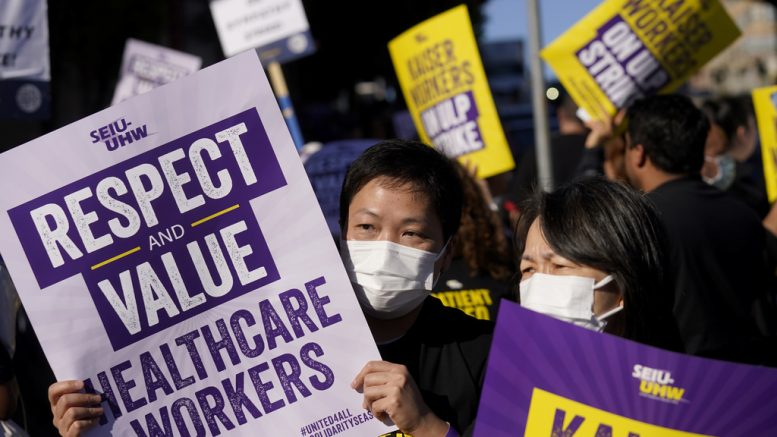NEW YORK (AP) — It’s been a big year for labor organizing in the U.S. And from auto production lines to Hollywood, all eyes are on strikes taking the world of work by storm.
The boiling point we’re seeing today comes amid soaring costs of living and rising inequality, including growing pay gaps between workers and top executives. Now, thousands of workers who were asked to make sacrifices during the pandemic even as corporate profits soared are asking for better pay and protections — and walking off the job if progress isn’t made in heated contract negotiations.
At least 453,000 workers have participated in 312 strikes in the U.S. this year, according to Johnnie Kallas, a Ph.D. candidate and the project director of Cornell University’s Labor Action Tracker. This year’s work stoppages have spread across multiple industries — including transportation, entertainment and hospitality.
Here’s a rundown of some of the largest strikes taking place in the U.S. today.
75,000 Kaiser Permanente workers walk off the job
In the health care sector, a major strike kicked off this week — with some 75,000 Kaiser Permanente workers walking off the job Wednesday in multiple states. Strikers include licensed vocational nurses, home health aides and ultrasound sonographers, as well as technicians in the radiology, X-ray, surgical, pharmacy and emergency departments.
The Coalition of Kaiser Permanente Unions, which represents about 85,000 of the health system’s employees nationally, approved a strike for three days in California, Colorado, Oregon and Washington, and for one day in Virginia and Washington, D.C.
Back in August, unions representing Kaiser workers asked for a $25 hourly minimum wage, as well as increases of 7% each year in the first two years and 6.25% each year in the two years afterward. Union members say understaffing is boosting the hospital system’s profits but hurting patients, and executives have been bargaining in bad faith during negotiations.
Company executive Michelle Gaskill-Hames defended Kaiser — saying its practices, compensation and retention are better than its competitors. Kaiser has proposed minimum hourly wages of between $21 and $23 next year depending on the location.
Kaiser is one of the country’s larger insurers and health care system operators, serving nearly 13 million people. The Oakland, California-based nonprofit said its 39 hospitals, including emergency rooms, will remain open during the picketing, though appointments and non-urgent procedures could be delayed. Doctors are also not participating in the strike, and Kaiser said it was bringing in thousands of temporary workers.
UAW strike nears 3-week mark, with 25,000 on the picket lines
In an unprecedented labor campaign against three major car companies, some 25,000 auto workers have joined picket lines in recent weeks
The United Auto Workers ‘ targeted strikes against General Motors, Stellantis and Ford began at select factories after the union’s contract with the companies expired in mid-September — and have grown to a total of five vehicle assembly plants and 38 parts warehouses since.
UAW President Shawn Fain has announced strike expansions on each of the past two Fridays, citing a lack of what the union says is meaningful progress, but it’s unclear how much that will continue as the strike nears its 3-week mark.
A person with direct knowledge of the talks told The Associated Press Wednesday that progress was reported at all three companies, with some offers being exchanged. Another said there was more movement in talks with Jeep maker Stellantis and less at Ford and General Motors. Neither wanted to be identified because they aren’t authorized to speak publicly about the bargaining.
Fain will update members on the negotiations again Friday. The union is seeking 36% general wage increases over four years, as well as a 32-hour week with 40 hours of pay, the restoration of traditional defined-benefit pensions for new hires and a return of cost-of-living pay raises, among other benefits.
The companies, however, fear that raising their labor costs could make their vehicles more expensive than those manufactured by Tesla or foreign automakers with U.S. factories where workers are paid less. Tensions have also risen amid layoffs impacting thousands of workers, with the auto makers saying some factories are running short on parts because of the strike.
Striking Hollywood actors resume talks with studios
Hollywood was taken by storm this summer with a historic dual strike from the unions representing writers and actors — bringing much of production to a halt.
After five months on the picket lines, the writers strike was declared over after their union approved a contract agreement with studios last week. Meanwhile, actors are still on strike — but a shot at cutting their own deal is finally on the horizon.
The Screen Actors Guild-American Federation of Television and Radio Artists began negotiations Monday with the same group of major studios and streaming services, the Alliance of Motion Picture and Television Producers, for the first time since they joined writers on the picket lines on July 14. The two sides resumed talks Wednesday.
With similar sticking points to the writers, actors and their employers have been divided on issues of pay, the use of artificial intelligence and self-taped auditions. SAG-AFTRA leaders said they would look closely at the gains and compromises of the writers’ deal, but emphasized that their demands would remain the same as they were when the strike began.
The two sides said in a joint statement that “several executives” from studios would be in on the talks, without providing names.
Southern California hotel workers’ rolling strikes
Thousands of hotel workers in Southern California have staged staggered walkouts over recent months. Union leaders are calling for better wages, improved health care, higher pension contributions, better safety protections and less strenuous workloads, among other benefits.
Members of Unite Here Local 11 overwhelmingly voted in favor of authorizing a strike back in June. After contracts expired at more than 60 hotels — including properties owned by major chains such as Marriott and Hilton — cooks, room attendants, dishwashers, servers, bellmen and front desk agents began picketing outside major hotels in Los Angeles and Orange counties at the start of July.
During the staggered strikes, workers have also called for solidarity and a boycott of hotels in the Los Angeles area. According to United Here Local 11’s website, the rolling walkouts surpassed the 100th strike mark last month.
While walkouts continue at dozens of hotels, two companies have made agreements with the union to date. On Friday, United Here Local 11 said that Biltmore Los Angeles had reached a tentative contract agreement — joining Westin Bonaventure Hotel & Suites, which averted walkouts with a June deal promising higher pay and increased staffing levels.





































